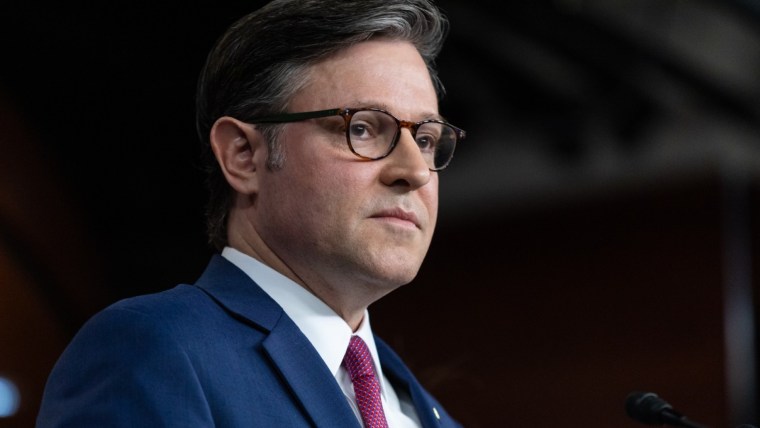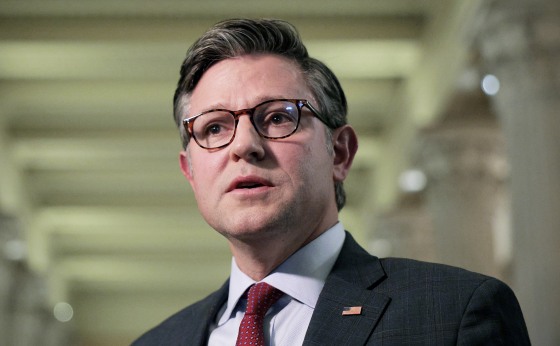The government shutdown enters its fourth week on Wednesday — and Speaker Mike Johnson, R-La., is adamant that he won’t reconvene the House until Senate Democrats accept his conference’s spending bill.
But one element of Johnson’s calculus may be more public relations than legislative strategy. Part of his decision to keep House Republicans at home during the standoff could be that some of the House GOP’s members — known for their colorful personalities, confrontational tactics and headline-grabbing comments — could do more harm than good with ready access to the congressional press corps.
Johnson alluded to that dynamic earlier this month when he told reporters it was “better” for Republicans and Democrats, “probably, to be physically separated right now.”
“I wish that weren’t the case, but we do have to turn the volume down,” he said.
That was the day after Sens. Mark Kelly and Ruben Gallego, both Arizona Democrats, confronted Johnson and Rep. Mike Lawler, R-N.Y., in the Capitol to press them on the shutdown and the delayed swearing-in of Rep.-elect Adelita Grijalva, D-Ariz.

Hours after that episode, Lawler went toe-to-toe with Rep. Hakeem Jeffries, D-N.Y., as the House minority leader left a press conference in the Capitol.
And that was just one day.
Of course, the opportunity for Democrats to step on their leadership’s message is just as real. Last week, roughly a dozen members of the Democratic Women’s Caucus marched to Johnson’s Capitol suite to pressure the speaker to swear in Grijalva. But during the confrontation, Rep. Nanette Barragán, D-Calif., got into a spat with a Capitol Police officer, handing Republicans ammunition to cast Democrats as anti-law enforcement.
Either way, the disadvantages of bringing his House GOP conference back seem to be winning out for Johnson. And Senate Republicans are welcoming that decision as they try to work through the shutdown stalemate.
“I’d send them on a CODEL to the other side of the moon,” Sen. Kevin Cramer, R-N.D., said of members of the House, referring to a congressional delegation trip.
“He probably doesn’t want them here negotiating with senators or whatever,” Cramer added. “I just think they’re better off being away; they’ve done their job.”
Cramer, a former member of the House, likened the situation to having “fewer cooks in the kitchen.”
“I think they’re better not having a large House Republican contingency here while we’re negotiating with Democrats,” he said.
Sen. Shelley Moore Capito, R-W.Va., said the vivacious nature of the House “probably factored into” Johnson’s decision to keep members out of town.
“Obviously there have been some confrontations over there,” said Capito, who also served in the House before jumping to the Senate. “When there’s not enough to do, there tends to be more emotions involved.”
Sen. Markwayne Mullin, R-Okla. — yet another a former House member who is often viewed as a liaison between Republicans in both chambers — said when members have empty schedules, they can cause trouble. He supported Johnson’s decision to leave his lawmakers at home.
“They don’t have things they’re working on, then what’s the point of being up here?” Mullin asked. “If you’re just sitting in your office, you’re not having hearings, you have a tendency to create problems that aren’t needed. And I’m not saying that would happen, I’m saying it could happen.”

One Senate Republican, who requested anonymity to speak candidly on the topic, said the strategy of keeping House members out of town is two-fold: It helps keep the party’s message intact, and it prevents “squishier” lawmakers from breaking ranks.
“He has to take into account that a few of his squishier members would come back and flip, or he’s better keeping them away than having them come back. It’s very smart,” the GOP senator said. “Political discipline is message discipline, and the longer they’re in their districts the less likely they’re causing trouble here.”
This week marks the fourth week that the House has canceled votes in the House. Johnson reiterated Monday morning that the House is on 48-hour notice, meaning members will be given two days to return if needed. Thus far, the chamber has not received such guidance.
But as the standoff drags on, pressure is mounting on the speaker to call the House back into session. A handful of Republicans have criticized the speaker’s decision to keep lawmakers at home and the message it sends. One of those lawmakers, Rep. Marjorie Taylor Greene, R-Ga., sharpened her disapproval on Monday.
“The House should be in session working. We should be finishing appropriations. Our committees should be working. We should be passing bills that make President Trump’s executive orders permanent,” Greene wrote on X. “I have no respect for the decision to refuse to work.”
Johnson has, at times, cracked open the door to bringing the House back. On Monday, he told reporters he would consider reconvening the chamber if the Senate approved a bill, led by Sen. Ron Johnson, R-Wis., that would pay some federal employees during the shutdown. The speaker noted, however, that he does not expect Senate Democrats to help approve that legislation.
“The ball would be back in our court and we’d probably do that,” Johnson said. “I don’t have any faith that they’re gonna pass it, though.”
“We’re on a 48-hour notice to return everybody to do work as soon as they’ll turn the lights on or do something meaningful like that,” he added.
Later on Monday, Senate Majority Leader John Thune, R-S.D., said the House should consider returning to Washington as the clock ticks towards Nov. 21 — the end date for the current spending bill. Republican leaders argued that the short-term spending measure would give appropriators more time to hash out full-year funding bills. But as the shutdown continues, lawmakers may need to rethink that date.
“Every day that passes, we got less time to fund the government,” Thune said.
Still, other senators are staying out of the debate about whether the House should come back.
“I try very hard not to get between a dog and a fire hydrant,” said Sen. John Kennedy, R-La. “I don’t have anything bad to say about the House.”
